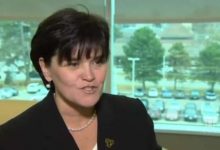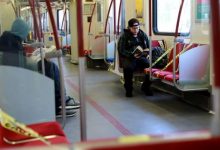Ford says he’s done ‘taking bullets’ for union members who wouldn’t inspect care homes
Premier Doug Ford said Thursday that he’s sick of “taking bullets” for unionized government inspectors who, he says, refused to go into the province’s long-term care homes to carry out inspections in the early days of the COVID-19 pandemic because of safety concerns.
Ford’s government has faced sharp criticism over the conditions in some long-term care homes following the release of a shocking report by the Canadian Armed Forces, which has sent soldiers in to help with the homes hit hardest by the novel coronavirus.
“The truth of the matter is, [inspectors] were refusing to go into these homes,” Ford said during his daily press briefing.
“Enough’s enough. They have to be accountable too.”
But Ford also lauded the work of Ontario Public Service Employees Union (OPSEU) President Smokey Thomas, who the premier said helped get inspectors back into care homes after their initial reluctance.
“I understand, they were scared,” Ford said. “I get it. They aren’t medical professionals.”
In a letter written to Ford and Minister of Long-Term Care Merrilee Fullerton dated April 22, Thomas said inspectors were “over-worked and frustrated,” but “dutifully committed to their obligations amidst this pandemic.
“They continue to investigate what needs to be done to flatten the curve and save lives, despite the fact only 164 inspectors are on the job supporting 626 homes,” Thomas wrote, while also pushing for increased staffing.
He also said that much — if not all — of the inspection work in the province was now being done by phone.
“But we now understand that your government wants to have in-person inspections. Thanks to the low staffing levels and the inherent risks to multiple parties from such inspections, this plan is not only ill-advised, but not necessary. In-person inspections will not provide us with any more information than we already have,” Thomas wrote, adding that the province was seeing the results of “years of neglect” to the system.
CBC News has reached out to Thomas for comment.
Meanwhile, Ontario reported 383 additional cases of COVID-19 on Thursday, ending two straight days of new daily cases below 300.
The 1.4 per cent increase in total cases marks a return to figures generally seen throughout the latter half of the month in the province. But the jump comes as Ontario’s network of labs surpassed its testing benchmark for the first time since May 17.
The Ministry of Health says 17,615 tests for the novel coronavirus were processed yesterday. The current daily testing target is 16,000, while the system has capacity to handle more than 23,000 on any given day.
The backlog of tests waiting to be processed increased to 11,868, meaning more than 16,000 samples were taken yesterday.
The new cases bring Ontario’s total since the outbreak began in late January to 26,866. Some 77 per cent of those cases are resolved.
Public Health Units in the Greater Toronto Area continue to account for a considerable majority, 65.6 per cent, of all cases. Yesterday, Toronto Public Health publicly released a detailed breakdown of cases by neighbourhood in the city.
The latest figures from the province’s public database show that 18 of Ontario’s 34 public health units have fewer than 10 actives cases of the novel coronavirus.
Ontario’s official death toll from the illness grew by 34 and now sits at 2,189. But data compiled directly from public health units, which avoids lag times in reporting, puts the current toll at 2,254.
Slightly more than 78 per cent of total COVID-19-linked deaths were residents in long-term care homes. The province has tracked a total of 289 outbreaks in long-term care facilities since the outbreak started.
Ford announced yesterday that his government would take control of the management of five long-term care homes in the wake of what he called a “gut wrenching” report about conditions inside the facilities.
The premier said Thursday that six teams of inspectors will be “actively monitoring” Ontario’s hardest-hit homes, and in the next three weeks, every home the province is “concerned about” will be inspected. Spot checks will also be happening, Ford said.
“No stone will be left unturned. We’re working around the clock to keep your loved ones safe,” Ford said.
Fullerton said Thursday that the homes listed in the military’s report have undergone 45 inspections from June 2018 to May 2020.
When asked why issues flagged in those inspections weren’t previously acted upon, Fullerton said the ministry has been trying to address a “staffing crisis” in long-term care.
“This is an ongoing issue,” she said.
Some health-care workers cleared to return to work
Confirmed cases of COVID-19 in patients being treated in Ontario hospitals are now at their lowest in a month:
- Hospitalizations: 833, down 14 from yesterday.
- Patients in ICUs: 137, down 13 from yesterday.
- Patients on ventilators: 94, down 23 from yesterday.
Minister of Health Christine Elliott told reporters Thursday that officials knew that case numbers would go up when reopening started.
“We feel relatively comfortable with this number,” she said, noting that health officials would need another week at least looking at numbers before going to the second phase of the reopening plans.
Meanwhile, dentists, optometrists and massage therapists are part of a list of health-care providers that the Ontario government says can gradually reopen following a months-long shutdown due to the COVID-19 pandemic.
Chiropractors, physiotherapists, psychologists, dietitians, denturists, and midwives are also included on the list released Wednesday as part of a new order from the province’s chief medical officer of health.
A spokeswoman for Elliott’s office said while the order takes effect immediately, that does not mean that all health services will be available on May 27.
“Health regulatory colleges are now in the process of developing guidance to ensure high-quality and safe clinical care that must be met before services can resume,” she said.
The provincial guidelines say providers must also comply with public health regulations and physical distancing guidelines to prevent the spread of the novel coronavirus.
In mid-March, the province ordered all non-essential and elective health services to close or reduce operations as COVID-19 cases increased.
Under this new directive, the province is also asking regulatory colleges to provide advice on which services can be provided virtually.
The province said the order will also allow hospitals to continue to develop and finalize plans to resume scheduled surgeries.
CBC








Redes Sociais - Comentários